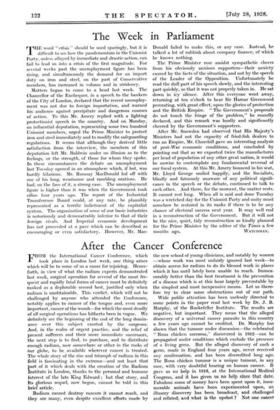The Week in Parliament
THE word " crisis " should be used sparingly, but it is difficult to see how the pandemonium in the Unionist Party, unless allayed by immediate and drastic action, can fail to lead us into a crisis of the first magnitude. For several weeks past the unemployment figure has been rising, and simultaneously the demand for an import duty on iron and steel, on the part of Conservative members, has increased in volume and in stridency.
Matters began to come to a head last week. The Chancellor of the Exchequer, in a speech to the bankers of the City of London, declared that the recent unemploy- ment was not due to foreign importation, and warned his audience against precipitate and dangerous courses of action. To this Mr. Amery replied with a fighting protectionist speech in the country. And on Monday, an influential deputation, representing some two hundred Unionist members, urged the Prime Minister to protect iron and steel immediately and to modify the safeguarding regulations. It seems that although they derived little satisfaction from the interview, the members of this deputation left Mr. Baldwin under no illusion as to the feelings, or the strength, of those for whom they spoke. In these circumstances the debate on unemployment last Tuesday opened in an atmosphere which, if hot, was hardly hilarious. Mr. Ramsay MacDonald led off with one of his long, wearisome and rambling orations. He had, on the face of it, a strong case. The unemployment figure is higher than it was when the Government took office four years ago. The report of the Industrial Transference Board could, at any rate, be plausibly represented as a terrific indictment of the capitalist system. The organization of some of our basic industries is notoriously and demonstrably inferior to that of their foreign rivals. And Imperial economic development has not proceeded at a pace which can be described as encouraging or even satisfactory. However, Mr. Mac- Donald failed to make this, or any case. Instead, he talked a lot of rubbish about company finance, of which he knows nothing.
The Prime Minister rose amidst sympathetic cheers from his obviously anxious supporters—their anxiety caused by the facts of the situation, and not by the speech of the Leader of the Opposition. Unfortunately he read the dull part of his speech slowly, and the interesting part quickly, so that it was not properly taken in. He sat - down in icy silence. After this everyone went away, returning at ten o'clock to hear Sir Hamar Greenwood perorating, with great effect, upon the glories of protection and the British Empire. " The Government's proposals do not touch the fringe of the problem," he roundly declared, and this remark was loudly and significantly cheered by the Government's supporters.
After Mr. Snowden had observed that His Majesty's Ministers had not the capacity of fried-fish dealers to run an Empire, Mr. Churchill gave an interesting analysis of post-War economic conditions, and concluded by pointing out that as we exported twice the manufactures per head of population of any other great nation, it would be unwise to contemplate any fundamental reversal of our fiscal system. At this Mr. Amery bounced in his seat, Mr. Lloyd George smiled happily, and the Socialists, blindly and fatuously unaware of any political signifi- cance in the speech or the debate, continued to talk to each other. And there, for the moment, the matter rests. It cannot rest long. When all is said and done Tuesday was a wretched day for the Unionist Party and unity must somehow be restored in its ranks if there is to be any chance of electoral success next year. It may well end in a reconstruction of the Government. But it will not be the nice, quiet, tidy reconstruction so kindly planned for the Prime Minister by the editor of the Times a few




































 Previous page
Previous page